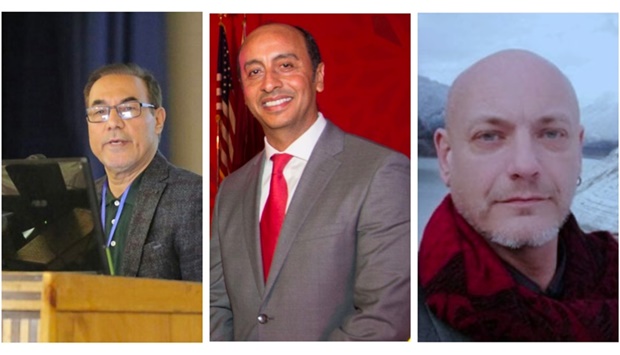The English Language Centre (ELC) at the Community College of Qatar (CCQ) organised the second International English Language Teaching Symposium virtually, under the theme of 'Reflection and Change - Language Teaching in a Post-Pandemic World', to reflect on how teaching during the Covid-19 pandemic has altered the outlook and approaches to learning and teaching English as an international language.
Masroor Hassan, chair of CCQ’s English Language Centre, opened the symposium with a welcome address highlighting the new, exciting and innovative ways that returning to the classroom following a long hiatus has brought to provide and incorporate adapted and adaptive methodologies.
The symposium started with a plenary session by Alan Mackenzie, director of Transform ELT, titled 'The Dance of Change: Transitioning to Teaching Online'. This was followed by three concurrent sessions that witnessed various valuable contributions by educators, researchers, lecturers and stakeholders from different local and international educational institutions, who shared their expertise to develop mechanisms and adopt new methodologies of English language teaching in a way that can help in overcoming different challenges and exceptional circumstances.
The first session addressed several important topics. Dr Toni Dobinson, from Curtin University, shed light on interaction in online classrooms during the Covid-19 pandemic and beyond; and then Prof Mehdi Riazi, from Hamad Bin Khalifa University, took the floor to discuss teacher reflection and how teachers might act regarding teaching English online during and after the pandemic.
Prof Ana Cad, from National University of Córdoba, also talked about gamifying second language lessons; while Juland Salayo, from University of Santo Tomas, discussed sustainable education through a digitised critical language pedagogy as a pandemic realisation.
In the second session, both Dr Dian Marissa and Wedad Allahji, from Yanbu University College, highlighted teachers’ role in promoting student engagement in transition times by examining lessons from competent teachers.
Dr Julian Chen, from Curtin University, examined a case study on revamping (Asian) language education during crisis teaching. Dr Hanna Sundari, from Indraprasta PGRI University, presented a working paper on the transition of language courses from face-to-face to online teaching.
The second session was concluded by Dr Olga Yashenkova, from Taras Shevchenko National University of Kyiv, who talked about embedding student partnership in assessment.
Dr Tom Godfrey, from International Training Institute, started the third session with a discussion about the art of teaching and how applied theatre can inform English language teaching. For his part, Dr Rachid Bendriss, from Weill Cornell Medicine-Qatar, presented a working paper on integrating design thinking in ESL project-based learning and learners' perceptions of its effectiveness.
Masroor Hassan, chair of CCQ’s English Language Centre, opened the symposium with a welcome address highlighting the new, exciting and innovative ways that returning to the classroom following a long hiatus has brought to provide and incorporate adapted and adaptive methodologies.
The symposium started with a plenary session by Alan Mackenzie, director of Transform ELT, titled 'The Dance of Change: Transitioning to Teaching Online'. This was followed by three concurrent sessions that witnessed various valuable contributions by educators, researchers, lecturers and stakeholders from different local and international educational institutions, who shared their expertise to develop mechanisms and adopt new methodologies of English language teaching in a way that can help in overcoming different challenges and exceptional circumstances.
The first session addressed several important topics. Dr Toni Dobinson, from Curtin University, shed light on interaction in online classrooms during the Covid-19 pandemic and beyond; and then Prof Mehdi Riazi, from Hamad Bin Khalifa University, took the floor to discuss teacher reflection and how teachers might act regarding teaching English online during and after the pandemic.
Prof Ana Cad, from National University of Córdoba, also talked about gamifying second language lessons; while Juland Salayo, from University of Santo Tomas, discussed sustainable education through a digitised critical language pedagogy as a pandemic realisation.
In the second session, both Dr Dian Marissa and Wedad Allahji, from Yanbu University College, highlighted teachers’ role in promoting student engagement in transition times by examining lessons from competent teachers.
Dr Julian Chen, from Curtin University, examined a case study on revamping (Asian) language education during crisis teaching. Dr Hanna Sundari, from Indraprasta PGRI University, presented a working paper on the transition of language courses from face-to-face to online teaching.
The second session was concluded by Dr Olga Yashenkova, from Taras Shevchenko National University of Kyiv, who talked about embedding student partnership in assessment.
Dr Tom Godfrey, from International Training Institute, started the third session with a discussion about the art of teaching and how applied theatre can inform English language teaching. For his part, Dr Rachid Bendriss, from Weill Cornell Medicine-Qatar, presented a working paper on integrating design thinking in ESL project-based learning and learners' perceptions of its effectiveness.

